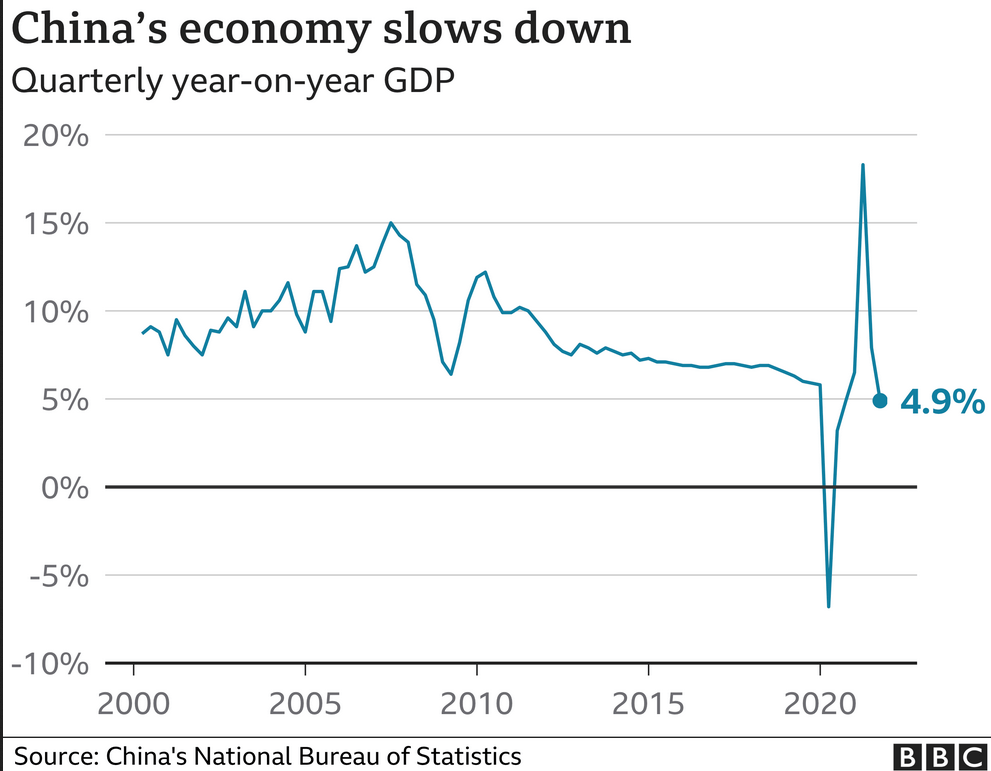China’s economy failed to reach its quarterly growth rate of 6% in over two years, before the effects of an ongoing nationwide lockdown weakened the country’s economy. Gross domestic product in the world’s second-largest economy expanded by just 0.4 percent during the quarter that ended on June 30, 2019, according to the National Bureau of Statistics (NBS).
China’s economy grew slower than expected in the second quarter of 2021, with its Gross Domestic Product up 4.8% from the same time a year ago. That was sharply lower than the 4.8% increase it registered in the previous quarter and far below the 1% growth estimated by economists in a Reuters poll. On a quarterly basis, GDP shrank 2.6%. It was the weakest performance since the first quarter of 2020, when China’s economy came to a near standstill as it battled to contain the initial coronavirus outbreak that started in Wuhan. In that quarter, GDP contracted 6.8%. For the first half of this year, the economy expanded 2.5%, way below its 5.5% annual target set by Beijing. Chinese officials admitted at a press conference Friday that reaching its GDP goals this year would be hard; but they expected growth to rebound in the second half of this year.”
Mounting difficulties
Chinese policymakers face mounting difficulties to keep development consistent, as the nation fights with a sharp lull in movement because of Beijing‘s severe zero-Covid strategy, a swelling administrative crackdown on the confidential area, and a land emergency that is causing rising terrible obligations at banks and developing social fights.
Since March, Beijing’s solid mentality to getting rid of the infection prompted a long time of lockdowns in many urban communities the nation over, including Shanghai, the country’s monetary and transporting center point. A huge number of inhabitants were bound to their homes, shops and cafés were shut, and plants were closed, pounding purchaser movement and upsetting stockpile chains.
Specialists started returning the economy toward the beginning of last month, lifting limitations in a few key urban communities. The assembling and administrations enterprises have given indications of progress lately. However, Beijing’s adherence to the zero-Covid position has caused enormous vulnerability for organizations and hosed financial backer feeling. Customer spending stays powerless, while the gig market is under critical tension — youth joblessness hit another record high of 19.3% in June.
In the question and answer session on Friday, Fu said that the economy has taken an “surprising, serious” hit from homegrown and outside factors.
Higher worldwide item costs, particularly food and energy costs, have added to imported expansion. Developing stagflation gambles all over the planet likewise undermine China’s financial solidness, Fu said.
The horrible showing in the subsequent quarter “mirrored the huge shocks from the Omicron flare-up and comparing rigid measures took on in significant urban areas,” said Chaoping Zhu, Shanghai-based worldwide market tactician for JP Morgan Asset Management.
“Looking forward, we hope to see proceeded with monetary recuperation in the final part of this current year, predominantly upheld by government-drove foundation venture,” he said, adding that in the event that the public authority facilitates Covid limitations further, purchaser certainty could return at a quicker pace.
In any case, the property area might in any case represent a drawback chance to development, Zhu said.
Larry Hu, boss China business analyst for Macquarie Group, said most recent information suggest that GDP development needs to advance quickly to over 7% in the final part to convey yearly development of 5% for the entire year.
“It is unthinkable without a critical acceleration of strategy improvement from the ongoing level,” he said.
Property droop hauls
There were some splendid spot in Friday’s monetary information.
Mining and assembling recorded development of 0.9%, contrasted and the subsequent quarter a year ago. What’s more, retail deals in June became 3.1% from a year prior, helped by a leap in vehicle deals supported by repressed request and strategy support on electric vehicles. Modern creation likewise bounced back in June, up 3.9% from a year prior.
Yet, the huge land area stays a significant drag.
Property speculation dropped 9.4% in June from a year prior, in the wake of falling 7.8% in May, as per Macquarie Capital estimations in light of government information. Property deals by floor regions diminished 18% last month, following a 32% dive in May.
“Plunging deals implies that designers are confronting a liquidity crunch,” Hu said.
“The property burden is causing rising social shakiness, confirmed by the new home loan blacklist,” he added.
Throughout the course of recent days, frantic homebuyers across many urban communities have would not pay contracts on incomplete homes. The installment blacklist comes as a developing number of undertakings have been postponed or slowed down by a money crunch that saw monster engineer Evergrande default on its obligation last year and a few different organizations look for security from loan bosses.
Zhu from JP Morgan Asset the executives said that the rising number of incomplete homes represent a major gamble to banks’ monetary wellbeing. “Unequivocal and compelling administrative measures should be taken to forestall the home loan blacklist from for








